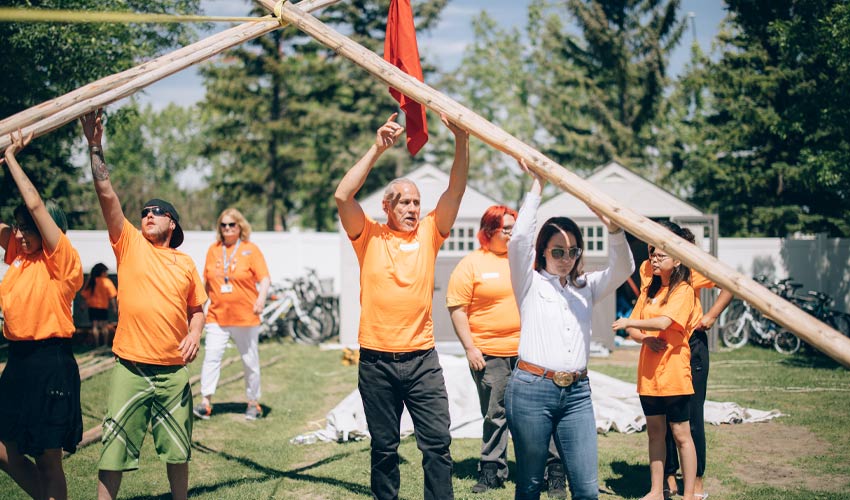TransAlta Indigenous Family Tipi officially blessed
Gift was made in support of MRU's Indigenous Family Housing Program

Dion Simon (centre), Mount Royal's Medicine Trail Coordinator, led the official raising and blessing of the TransAlta Indigenous Family Tipi on July 14, which serves as a focal point for ceremonies, celebrations and informal gatherings.
Mount Royal hosted several guests from TransAlta Corporation on July 14 for the long-awaited blessing and installation ceremony of the TransAlta Indigenous Family Tipi. Although the tipi has been on campus since November 2020, the official ceremony had to be delayed due to the pandemic.
The Iniskim Centre’s Medicine Trail Coordinator Dion Simon led the group in a tobacco and medicine offering to the land upon which the tipi sits. Remarks were also made by President and Vice-Chancellor Tim Rahilly, PhD, Steve Kootenay-Jobin, events and housing coordinator for the Iniskim Centre, John Fischer, director of the Iniskim Centre, and Mark Keller, director of Residence Services at MRU.
Several guests wore orange shirts in recognition of the harm done to residential school students and as a show of commitment to the principle that every child matters.
The tipi is the result of a generous $40,000 gift from TransAlta made specifically to MRU's unique Indigenous Housing Program (IHP). Concerned about the isolation of the family residents on campus during the pandemic, TransAlta suggested a tipi would help bring them together outside in a space that also allowed for social distancing. The 25-foot tipi is of Blackfoot style, and TransAlta's gift also provided for outdoor furnishings such as tables and seating, a barbecue, storage units, additional bike racks and a children’s playhouse. Children’s programming, elder engagement and opportunities for cultural and spiritual expression have also been planned, as well as Indigenous artwork and murals.
Run through the Iniskim Centre, the IHP provides students who self-identify as First Nations, Métis, Non-status or Inuit with affordable individual or family housing and cultural, academic and social supports. Students and their families live on campus year-round throughout their entire MRU experience, from the beginning of their program through to graduation.
“It has been a significant program in bridging barriers, closing gaps, increasing retention and contributing to Indigenous student success,” says Kootenay-Jobin.
“We wanted to remove the institutional look and feel, because Mount Royal is home for these families. This is a family community. We had a vision that this space needs to be reflective of Indigenous cultures and spirituality so that we are fostering a community that works towards growth, knowledge, education and safety, while also staying grounded in identity.”
The TransAlta Indigenous Family Tipi is located near the IHP residences on the east side of campus and serves as a focal point for ceremonies, celebrations and informal gatherings, while also helping to reinforce a sense of home for the students and families of the program.
“Each one of the poles inside of the tipi represent our family members, our grandparents, our community members. And it encompasses the vision and the concept that it really does take a village to raise a child,” Kootenay-Jobin says.
TransAlta has contributed more than $1.5 million to MRU over the years, including $1 million to the Taylor Centre for the Performing Arts, resulting in the naming of the TransAlta Pavilion, and several thousand to the Harry G. Schaefer Mentorship Program. Mount Royal's Chancellor Dawn Farrell (previously the president and CEO of TransAlta), was at TransAlta's helm when these earlier donations were made.
“TransAlta is a long-standing supporter of Mount Royal University and we are proud to provide funding for the Indigenous Family Housing Program. Through this donation we wanted to show our commitment to supporting the traditions of Indigenous students who are attending and living on campus at MRU,” says Kerry O’Reilly Wilks, executive vice-president, Legal, Commercial and External Affairs at TransAlta.
“TransAlta hopes that the tipi and associated programming will promote cultural and spiritual expression while helping to foster a sense of community and providing a gathering space for Indigenous families living on campus.”
As the IHP continues to grow, Kootenay-Jobin is optimistic about the impact the program can have on a larger scale.
“We hope it is noticed across the country, so that other post-secondary institutions can begin replicating and offering programs like this. Programs such as the IHP are pivotal to students’ success.”
Learn more about indigenization at MRU.
Updated July 14, 2022 — Rachel von Hahn
